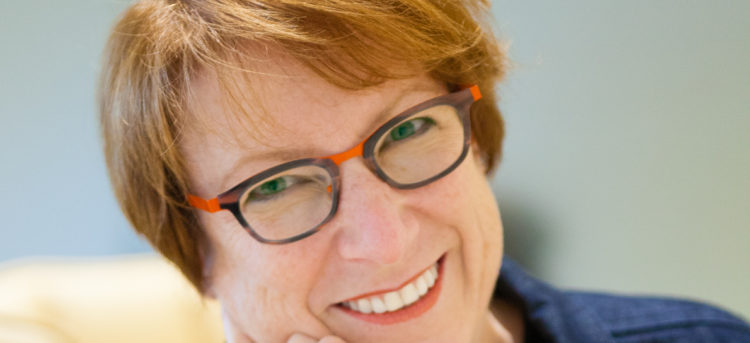Leslie Saul & Associates, Inc. is an architecture and interior design firm based in Cambridge, Massachusetts that primarily services the greater Boston and Miami areas. The business focuses on renovations including offices, restaurants, retail stores, senior living facilities, private homes, universities, churches, and synagogues, among many other building types. Founder Leslie Saul says that having such a broad practice has helped her maintain a business for more than 26 years. Additionally, her attention to quality and value have brought back return customers and helped retain long-term employees.
Why did you start your business?
I went to Rhode Island School of Design. When I applied, I wanted to be a painter. I took a gap year and realized that I’m a people person. I got my degree in architecture. Even when I was in school, I was really focused on interiors, partly because of my painting background.
I worked my way up in the architecture business, working for various firms. I talked to a friend from a big firm who mentioned a model shop they didn’t really use. He mentioned that maybe I should start my own firm. Once I had that space, I asked my previous firm to buy me out. I wanted my firm to be family-friendly, with flextime and things like that. Those things are very common now, but at the time, I had a four-year-old and I felt limited by not having them, even though I was a principal at my old firm.
How did you fund the business at the start?
I used my savings. And, in 1992, American Express gave me credit even though I had no income. My husband worked, so we had one income, but we gave up everything, from newspapers to dinners out. Within six months of starting, we were cash flow neutral.
How do you manage cash flow?
We ask for retainers from our clients. It needs to be enough money to show a seriousness of purpose, even though it might not necessarily cover the costs for the first month. When we get inquiries, we sometimes do some initial low-cost services that get clients comfortable working with us
To help with cash flow, I don’t take a big salary to keep a lot of cash in the business. I’ve never missed a paycheck over 26 years, except for my own. I’ve learned that people will stick with you if you stick with them. If you lay people off at the start of a slow down, you may not be able to hire people when you need them. Though that may negatively impact cash flow, we have the benefit of keeping our team together and being able to produce very quickly when new clients bring us on board.
What’s the most challenging thing about running the company?
Continuing to grow the quality of projects and clients. I’ve never focused on quantity. When I worked for larger firms that do focus on quantity, it felt like I was just keeping the underlings motivated versus getting my own satisfaction from any of the work.
What’s the most rewarding thing about running the company?
Seeing the successes and development of the people who have worked for us over the years. Not only the long-timers, but also the people who move away and call me and say, “I always say to myself, what would Leslie do?” That’s very rewarding and I feel very proud of them!
There’s no better gratification than seeing a finished product and knowing how you’ve fulfilled a client’s needs and wants and overcome their challenges. Just this morning, we were talking to an old client who said, “I’m not sure if I ever told you how much we love this and how perfect everything you did was!”
What’s the biggest mistake you made when starting out?
We’ve made some economic mistakes like setting a fee too low or not really understanding the scope before starting a project. I was and probably still am easily bullied when it comes to money, especially when it comes to doing work for larger firms.
What’s the smartest thing you did when starting out?
I asked a friend to help me and he said I needed a good phone number. It was so memorable! People still say they call that number when they try to reach us, even though we moved 19 years ago!
Also, I hired people who filled my weaknesses. I think a lot of entrepreneurs hire themselves, especially in my industry. The smartest thing you can do is to be honest with yourself about what your weaknesses are and hire people that are good at those things. Together, you’re better than anyone individually.
What advice would you give to a new entrepreneur?
You will do great! Always believe in yourself! Always do the right thing. Always stay true to your values and remember your reputation can’t be rebuilt.
What’s next for Leslie Saul & Associates, Inc.
I’ll be turning 65 and I want to keep this going. I really enjoy what I do. I like the idea that design services should not just be the exclusive benefit of wealthy people. I feel like there are others who have needs that we can help meet. So, I feel like I haven’t finished and there’s a lot in our future.
This article was originally written on June 4, 2019 and updated on June 5, 2019.


Have at it! We'd love to hear from you and encourage a lively discussion among our users. Please help us keep our site clean and protect yourself. Refrain from posting overtly promotional content, and avoid disclosing personal information such as bank account or phone numbers.
Reviews Disclosure: The responses below are not provided or commissioned by the credit card, financing and service companies that appear on this site. Responses have not been reviewed, approved or otherwise endorsed by the credit card, financing and service companies and it is not their responsibility to ensure all posts and/or questions are answered.